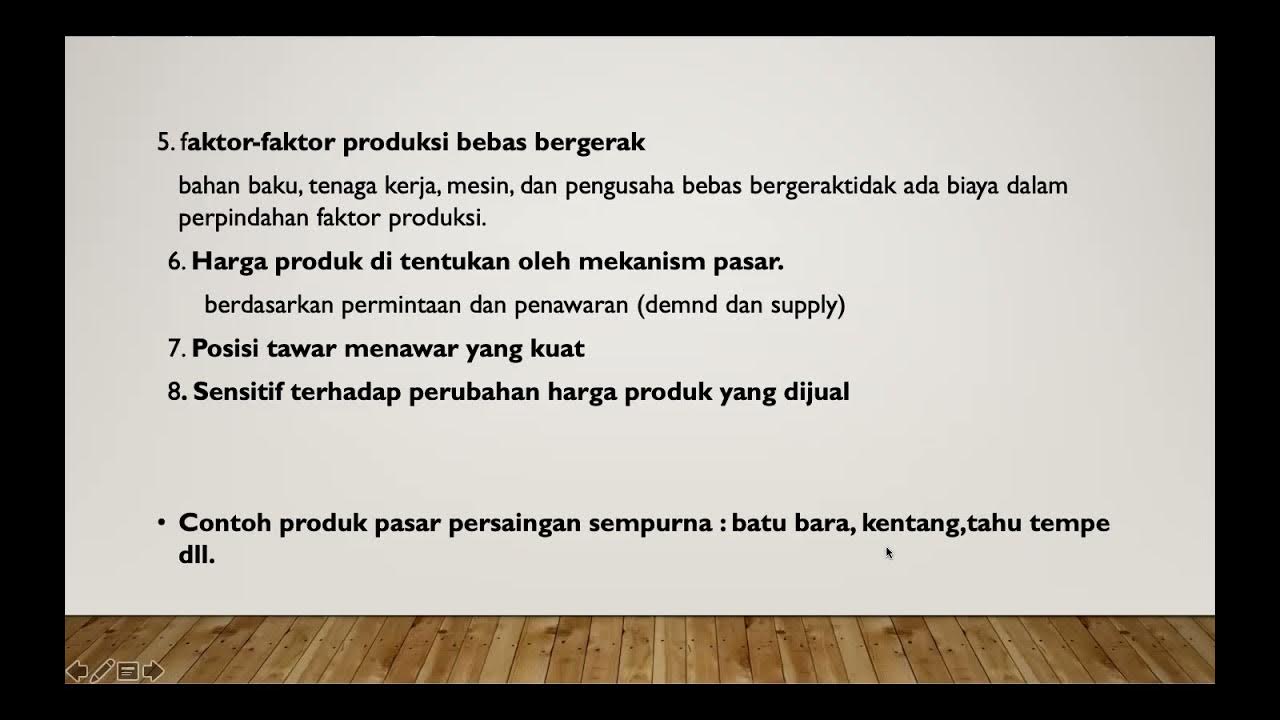Soal dan Pembahasan Sumber Kegagalan Pasar serta Mengevaluasi Mekanisme Pasar (Part 63)
Summary
TLDRThe transcript delves into market failures and the imperfections of real-world markets compared to the idealized model of perfect competition. It covers key concepts like market inefficiencies, public goods, externalities (both positive and negative), imperfect information, and the need for government intervention. The script explains how the theory of perfect competition, while optimal in theory, does not hold in practice due to various factors such as monopolies, externalities, and misallocation of resources. The importance of balancing efficiency with equity in economic policy is also emphasized.
Takeaways
- 😀 **Perfect Competition vs. Real Markets**: Perfect competition, as an ideal model, does not exist in the real world due to various assumptions not being met, leading to market failures.
- 😀 **Market Failure Definition**: Market failure occurs when resources are not allocated efficiently, leading to misallocation or inefficiencies in the economy.
- 😀 **Imperfect Markets**: A key cause of market failure is imperfect competition, such as monopolies and oligopolies, where firms have the power to set prices above marginal costs, causing inefficiencies.
- 😀 **Public Goods**: Public goods are non-excludable and non-rivalrous. Free rider problems often arise because people can benefit from them without paying, requiring government intervention.
- 😀 **Externalities**: Externalities can be positive or negative. A negative externality, such as pollution or noise, affects third parties not involved in the market transaction, while positive externalities, like education, benefit others beyond the individual consumer.
- 😀 **Imperfect Information**: Market participants often lack complete or accurate information, which leads to inefficient decisions, as seen in medical care or advertising, where consumers may be misled.
- 😀 **Housing is Not a Public Good**: Housing, unlike public goods, is excludable (requires payment) and rivalrous (only a certain number of houses available), making it inefficient if provided for free by the government.
- 😀 **Role of Government**: The government plays a crucial role in addressing market failures, whether by providing public goods, regulating negative externalities, or offering services like education and healthcare to ensure equity.
- 😀 **Efficiency vs. Equity**: Policies must balance efficiency (optimal resource allocation) with equity (fair access to goods and services). Focusing only on efficiency may harm lower-income individuals who lack purchasing power.
- 😀 **Balancing Market Outcomes**: A system that prioritizes only efficiency may lead to negative outcomes for the less privileged, while focusing solely on equity can create inefficiencies. A balance between the two is essential for a well-functioning economy.
Q & A
What is the main reason why perfect competition does not exist in the real world?
-The main reason perfect competition does not exist in the real world is due to the unrealistic assumptions in its theory, such as perfect information and no barriers to entry, which cannot be fully met in actual markets. This leads to market failure.
What is a market failure and how does it relate to resource allocation?
-A market failure occurs when a market does not allocate resources efficiently. This often results in misallocation, where resources are either overallocated to one sector or underallocated to another, leading to inefficiency.
What are the four main types of market failure mentioned in the transcript?
-The four main types of market failure mentioned are: imperfect markets, public goods, externalities, and imperfect information.
Why is perfect competition considered the ideal market condition by economists?
-Economists consider perfect competition the ideal because it maximizes efficiency, with producers and consumers interacting freely, and goods being allocated at the optimal price. In this condition, no single producer can influence market prices.
How does market competition become inefficient in imperfect markets?
-In imperfect markets, producers act as price makers rather than price takers, meaning they have the ability to influence prices. This prevents the price from equating to marginal cost, leading to inefficiency in resource allocation.
What role does the government play in correcting market failures?
-The government intervenes in markets to correct failures by promoting efficiency and equity. This can involve regulation, taxation, or providing public goods to address situations where the market does not allocate resources fairly or efficiently.
What is the distinction between private goods and public goods?
-Private goods are those that require payment for consumption, and their use by one person excludes others from using them. Public goods, on the other hand, are non-rivalrous and non-excludable, meaning they can be used by everyone without preventing others from using them.
What is an example of a negative externality and how does it affect market efficiency?
-An example of a negative externality is smoking. When a person smokes, they create costs for others, such as health risks or environmental harm, which are not reflected in the price of the product, leading to inefficiency in the market.
How does imperfect information impact market behavior?
-Imperfect information can distort market behavior by preventing consumers and producers from making fully informed decisions. For example, if a producer knows the best price for a resource but others do not, it can lead to market inefficiencies and unfair advantages.
Why is housing not considered a public good, according to the transcript?
-Housing is not considered a public good because it is excludable and rivalrous. People must pay for housing, and providing free housing could lead to inefficiencies, such as unequal distribution or overuse of limited resources.
Outlines

This section is available to paid users only. Please upgrade to access this part.
Upgrade NowMindmap

This section is available to paid users only. Please upgrade to access this part.
Upgrade NowKeywords

This section is available to paid users only. Please upgrade to access this part.
Upgrade NowHighlights

This section is available to paid users only. Please upgrade to access this part.
Upgrade NowTranscripts

This section is available to paid users only. Please upgrade to access this part.
Upgrade Now5.0 / 5 (0 votes)





